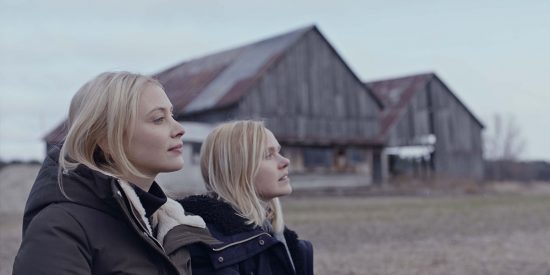TIFF 2021 Review: All My Puny Sorrows – “A quintessential Canadian film”

Image Courtesy of TIFF
“How many of us can actually conceptualize death?” Understand it?” These are questions asked in the opening voiceover of Canadian director Michael McGowan‘s newest film, All My Puny Sorrows. Adapted from Miriam Towes‘ novel of the same name, the film follows the women of the Von Riesen family, for whom grief and loss seem to surround. Of anyone, they seem best able to answer their own questions about death, such is their unfortunate experience.
These suicidal tendencies run in the family, her father (played in flashbacks by Donal Logue) having stepped in front of a train years before. This leaves the girls and their unquestionably strong mother (the ever-dependable Mare Winningham) as they also leave the Mennonite community that seems to have had a hand in this family tragedy. But this time, when Elf ends up in the hospital after another attempt at dying by suicide, Yoli is forced to confront and understand her sister’s deeply rooted depression while trying to keep what little of their family remains, together.
Not surprisingly for the director, whose credits include the wonderful One Week starring Joshua Jackson as well as the 2010 TIFF opening night film Score: A Hockey Musical, All My Puny Sorrows is unapologetically Canadian. There are mentions of the Toronto Blue Jays and Pierre Trudeau and even the inclusion of the ‘u’ in the word colour when Yoli is typing (it’s strange what excites you watching film as a Canadian). The film was shot largely in North Bay, standing in for Winnipeg, with some Toronto views towards the end of the film. McGowan also utilizes the stark winter backgrounds that can accompany Canadian winters for this often bleak tale. But while making a quintessential Canadian film, the themes of mental illness, grief, and loss are universal.
It follows that this film is not always an easy watch, though not just for the subject matter. While I haven’t had the privilege of reading the source material, it feels as if some of the details that might make the Von Reisen family’s story even more emotionally impactful have been only briefly touched upon for the adaptation. Brief flashbacks of Yoli and Elf’s childhood amongst the Mennonite community and the treatment of their family bring forth some generalized concepts, but there are too many holes to form concrete conclusions. Some characters deserved a little more development as well, including Winningham’s role as Yoli and Elf’s steadfast mother. I’m more apt now to read the novel, than re-watch the film.
All My Puny Sorrows works best when Pill and Gadon are engaged in their witty banter, easily believable as the sister roles in which they were cast. Their chemistry works, and both actors perform well here as they manage to inject some unexpected humour in a film that otherwise offers little in the way of reprieve from the depths of Elf’s depression, the Von Reisen’s continued grief and their constant threat of added loss. I appreciate the respect and care that went into this adaptation. It’s a tricky subject matter, and I feel it’s well handled, but for me it didn’t connect as much as I needed it to. While a worthwhile discussion can be opened about mental health and its treatment and support systems (or lack thereof), the film for me was often a difficult road to travel for a conclusion that felt already fated.










